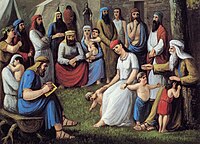| Part of a series on |
| People in the Book of Mormon |
|---|
 |
According to the Book of Mormon, Amaleki (/əˈmæləkaɪ/)[1] was one of several Nephite record keepers who maintained records on metal plates known as the plates of Nephi. The Book of Mormon refers to the small plates of Nephi[2] and the large plates of Nephi.[3] Nephi began writing on the small plates about 570 BC.[4] Nephi's brother Jacob and his descendants began keeping records of sacred and religious matters on the small plates around 544 BC.[5] Seven of Jacob's descendants, including Amaleki, wrote on the plates.[6] Amaleki recorded his account on the plates about 130 BC. He states at the end of his writings that the plates are full.[7] He received the plates of Nephi from his father Abinadom and penned 18 verses in the Book of Omni (Omni 1:12-30).[8] He was the last person to write in the small plates of Nephi.[9] Having no descendants, Amaleki gave the small plates to King Benjamin.[10]
- ^ churchofjesuschrist.org: "Book of Mormon Pronunciation Guide" (retrieved 2012-02-25), IPA-ified from «a-măl´a-kī»
- ^ Jacob 1:1
- ^ Jacob 3:13
- ^ 2 Nephi 5:28-33
- ^ Jacob 1:1-4
- ^ Largey, Dennis L. (2003). Book of Mormon Reference Companion. Salt Lake City, UT: Deseret Book Company. p. 646. ISBN 1-57345-231-9.
- ^ Omni 1:30
- ^ Skousen, Royal (2009). The Book of Mormon: The Earliest Text. New Haven: Yale University Press. pp. 187–189. ISBN 978-0-300-14218-1.
- ^ Whiting, Gary. "The Testimony of Amaleki". rsc.byu.edu. Brigham Young University. Retrieved 2 February 2022.
- ^ Harris, Sharon J. (2020). Enos, Jarom, Omni: A Brief Theological Introduction. Provo, UT: Neal A. Maxwell Institute, Brigham Young University. p. 100. ISBN 978-0-8425-0015-9.